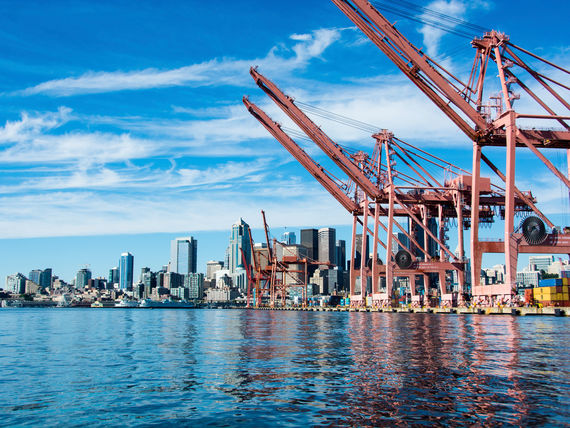Port technology the key to unlocking efficiency and smoother supply chains

September 4, 2018 - Reliable port infrastructure is critical to the effectiveness of the UK’s supply chains and can unlock solutions to some of the pressing logistical challenges.
Moreover, with more than 60% of all global seaborne trade being moved in containers, box ports are crucial.
Containerisation has boomed since its conceptualisation in the 1960s, significantly simplifying intermodal freight transport. According to Statista, $12 trillion-worth of goods were moved around the world by container in 2017.
A great chunk of that trade was moved between Asia and North Europe, routes used by the world’s biggest containerships.
Britain is an important market on those routes, which means it is vital the country’s deepsea container ports are efficient, not just to the benefit of Britain, but Europe and Asia too.
UK ports have a key role to play in facilitating trade flows with minimal delay, especially in a consumer-driven world where time is of the essence across almost every product category.
To anyone responsible for moving cargo in and out of the UK, a port is a port. Its role is to load and unload ships and ensure cargo transits into and out of the hinterland securely and speedily.
But no two ports are the same, and technology and customer service is leading to even further differentiation.
Utilising that technology to deliver reliability and certainty is important. But when circumstances mean technology can’t deliver that, port users should be fully engaged and treated like customers to ensure continued supply chain integrity.
When they aren’t – and given there is parity in haulage costs to and from UK ports – shippers should recognise that they have a choice, review ports and wriggle for change. They can’t afford to continue accepting the status quo.
Needs of shippers are changing
The needs of shipping lines, cargo owners and freight forwarders are evolving. Modern day container vessels require bigger cranes with more sophisticated technology, deeper water and greater yard space. Moreover, ports need highly trained staff and efficient processes so cargo can move through them as freely as possible.
This combination of technology and seasoned port professionals, who are willing to work closely with all stakeholders, from shipping line personnel, to freight forwarders, import/export managers, hauliers and more, means ports can better serve supply chains in these times of evolution.
Speed, collaboration and efficiency are key
Simply put, containers and cargo need to be able to pass through ports in as little time as possible. Ports are investing in the latest technology to facilitate this. Automated stacking cranes, for instance, enhance safety and efficiency and can operate in strong winds that typically result in ports shutting down until weather improves. This in turn ensures truck-turnaround times are consistently kept low.
Modern inspection facilities are also key, but even with new tech, fostering close collaboration with stakeholders is just as important for ensuring containers transit ports – and on to their final destination – in good time. Finding smarter ways of working with shippers and port users means the amount of time containers spend in the port, whether subject to physical inspections or not, is reduced drastically.
In recent months, DP World in the UK has been working with beverage manufacturers to work in smarter ways that reduce turnaround times for these time-sensitive goods. By talking through challenges and reaching mutual understanding, solutions can be agreed and trialled, which means turnaround time for trucks can be reduced while equipment can be deployed more efficiently.
Port choice is good news for UK PLC
As a trading nation – and an island nation, which lives and dies by the efficiency of its maritime infrastructure – a choice of ports guarantees resilience and reliability for the UK economy. It ensures shop shelves are full, goods are delivered to consumers’ doors on time and time-critical parts reach factories on schedule. Ports have a responsibility to provide the market with this choice by investing in infrastructure and building better relationships across the supply chain.
Source: The Loadstar


